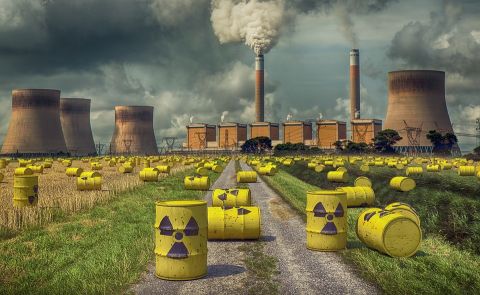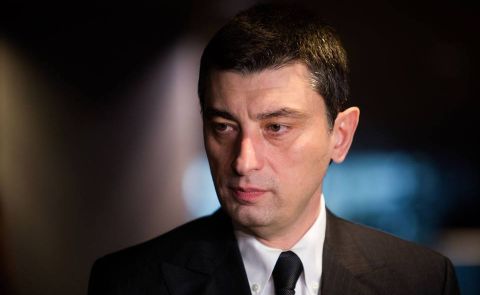
Recent developments in Georgia regarding Ukraine

Ukraine recalls ambassador from Georgia
Ukraine has summoned its ambassador from Georgia, indicating Kyiv's growing dissatisfaction with Tbilisi's cautious response to Russia's aggression in Ukraine.
President of Ukraine Volodymyr Zelenskyy announced the move in a video speech on March 1 in which he accused Georgia's administration of "immoral actions."
"Our diplomats are taking reasonable and necessary actions against governments that have broken their promises and violated international law," Zelenskyy added. According to him, Ukraine's ambassador to Kyrgyzstan has also been summoned due to Kyrgyz authorities' remarks "justifying Russia's aggression against Ukraine."
Irakli Kobakhidze, the chairperson of the Georgian Dream party, and Ilia Darchiashvili, the head of the Government Administration, have responded to Zelenskyy's decision to recall their ambassador from Georgia and impose sanctions on Russia due to Tbilisi's refusal of a chartered flight to transport volunteers to Ukraine.
"There appears to be a concerted effort to draw Georgia into the military conflict. To put it plainly, the Ukrainian authorities' extremely sad decision is a reflection of this coordinating action," MP Kobakhidze stated.
Considering Georgia's support for Ukraine in international organisations throughout the conflict, MP Kobakhidze said Kyiv's decision was "totally wrong and indefensible."
"Attempts and provocations to lure Georgia into the conflict are not halting," said Head of Government Ilia Darchiashvili, echoing the GD party chair. "This process is directly masterminded by a destructive opposition and the United National Movement."
The chair of the ruling party said that Georgia's main opposition party, the United National Movement, was participating in the alleged scheme from the Georgian side, but he did not point fingers at any specific party or individual on the Ukrainian side.
On February 28, a jet that was supposed to transport the group from Georgia to Poland was denied permission to land in Tbilisi. "The Georgian government has turned from ostensibly neutrality to collaboration with Mordor, the Russian Federation's terrorist state," claimed Davit Katsarava, the leader of an amateur patrol organisation called Strength in Unity.
Late on February 28, Ukrainian Prime Minister Denys Shmyhal tweeted, "Brave Georgian brothers are waiting in the airport to fly out and support Ukraine." Irakli Garibashvili, his Georgian equivalent, was urged to "show guts" and allow the flight to continue.
The next day, Irakli Kobakhidze, the head of the ruling Georgian Dream party, justified his government's approach as pragmatic. "Sending warriors to Ukraine implies actually participating in the conflict," Kobakhidze explained. "The Georgian government has to take responsibility for its actions."
"Georgia does not want to engage in the financial and economic sanctions [on Russia] because of our national interests and the interests of the people," Garibashvili stated on February 25. He then declined to speak about the war at a planned special session of parliament. "I'm not going to the legislature. The parliament has its responsibilities, I have mine, and the battle in Ukraine continues."
The government's approach has already been challenged by Zelenskyy. He thanked Georgian people for uniting in favour of Ukraine in a tweet on February 26. "There are moments when citizens are not government, but better than government," Zelenskyy said emphatically.
Garibashvili, on the other hand, has stuck to his guns. On February 28, he declared, "the Ukrainian capital is being attacked, and as we can see, nobody is able to stop it. Let's face it: sanctions aren't very effective."
"No one is begging you to take on the role of Zelenskyy; just shut up. Stop humiliating us," commented Ombudsman Nino Lomjaria on Facebook. In one popular video, an elderly woman asked, "Do you see this, Garibashvili?" as she brandished a rolling pin. "Is this what you're looking for?" "Return to your starting point."
The invasion has inspired an outpouring of support with Ukraine in Georgia, which endured a terrible Russian invasion in 2008. 30,000 people gathered in Tbilisi on Friday, waving Ukrainian and Georgian flags, and singing the national anthems of both nations.
Zalkaliani justifies Ukraine policy
Georgia's Deputy Prime Minister and Foreign Minister David Zalkaliani, defended and justified Georgian Prime Minister Irakli Garibashvili's "conservative" approach on Ukraine events and unwillingness to join international sanctions against Russia on February 28.
"They (Russian soldiers) are positioned 40 kilometres away [from Tbilisi]," the top diplomat said at a news conference at the Government Chancellery. “They won't even require extra force mobilisation for months, like they did in Ukraine."
"We see the consequences of the occupation from the [main east-west] route," Zalkaliani. “Georgia will be turned upside down in a matter of minutes. What do you think, do you believe we don't know what they're going to do?"
Georgia "does not shy away from hard actions," FM Zalkaliani said in his speech. Georgia, he reminded, has been a signatory to Western sanctions on Crimea since 2014.
"However, when it comes to particular nation sanctions, the Prime Minister has clearly stated what risks we perceive [in this area]."
Georgian officials are addressing the threats with European and Ukrainian counterparts, he added.
Georgia to set aside USD 315,000 million for humanitarian aid to Ukraine
Georgia's government said that it will use GEL 1 million (USD 315 thousand) from its reserve money to offer humanitarian help to Ukraine in the wake of Russia's invasion.
The Georgian government claimed that the cash will be used to purchase pharmaceutical and medical supplies for war victims from the Ministry of IDPs from Occupied Territories, Labour, Health, and Social Affairs.
Prime Minister Irakli Garibashvili is said to have already signed the required order.
The news comes as the Georgian Prime Minister faces widespread criticism for provocative statements regarding Ukraine and a firm refusal to join international sanctions against Russia.
On February 24, Russia launched a full-scale invasion of Ukraine after President Vladimir Putin announced a "special military operation." In violation of the Minsk Accords, Moscow acknowledged its proxies in Donetsk and Luhansk on February 21.
Also, Russia lobbied for months for a military build-up in and around Ukraine, insisting that NATO reject the 2008 Bucharest vow on recognising Ukraine and Georgia, and that the United States refrain from establishing military sites in former Soviet republics.
Georgian Prime Minister and EU Commissioner discuss Ukraine and EU integration
Irakli Garibashvili, Georgia's Prime Minister, spoke over the phone with Oliver Várhelyi, the EU Commissioner for Neighbourhood and Enlargement.
“In these trying circumstances, I had a pleasant and fruitful chat with Commissioner Oliver Várhelyi," the Prime Minister tweeted.
He claimed the conversation covered the situation in Ukraine, the wider area, and Georgia's European membership aspirations.
Earlier, Polish President Andrzej Duda recommended that NATO arrange discussions with the leaders of Georgia and Ukraine during the Alliance's Madrid Summit in June 2022.
President Duda made the declaration after meeting NATO Secretary-General Jens Stoltenberg, emphasising that conversations with Presidents Salome Zourabichvili and Volodymyr Zelenskyy will show support to the two nations and that NATO is not abandoning them.
"They have always been committed allies of NATO, and the Alliance remembers them in this regard," the Polish President said, adding that it was one of the most pressing concerns "especially for the Alliance's reputation."
In December 2021, the Georgian Foreign Ministry condemned Moscow's demand that NATO revokes the 2008 Bucharest Summit agreement, which said that Georgia and Ukraine will ultimately join the alliance, as unacceptable.
The Russian Foreign Ministry (MID) stated, "in the basic interests of European security, it is important to openly repudiate the 2008 NATO Bucharest Summit resolution that Ukraine and Georgia would become NATO members."
Moscow's demands were spelt out in a long MID statement, which stated that NATO partners' agreement at the 2008 Bucharest Summit to not increase security at the expense of other governments, including Russia, violated their commitment to the OSCE.
Georgia sends Ukraine humanitarian aid
Georgia has supplied 80 tons of humanitarian supplies to Ukraine, according to the Ukrainian Embassy in Tbilisi.
"A genuine friend is someone who helps you not just in words but also indeed in these terribly tough times," the Ukrainian Embassy posted on Facebook.
The Georgian government announced its plan to acquire humanitarian supplies costing GEL 1 million (USD 315 thousand).
Thousands of first-aid goods, over 30 different types of pharmaceuticals, and oxygen concentrators are among the humanitarian cargo transferred to Ukraine via Warsaw, according to the government.
Earlier, thousands of protesters gathered in front of Tbilisi's State Chancellery to show their support for Ukraine and to protest Georgian Prime Minister Irakli Garibashvili's decision not to join international sanctions on Russia.
Protesters painted the government building's wall with the colours of the Ukrainian flag at the request of the opposition Droa political party. The demonstrators said that Irakli Garibashvili did not represent Georgian citizens and that he should resign.
Garibashvili: Sanctions are ineffective, and no one can stop the bombing of Kyiv
"The capital of Ukraine is being attacked, and we see that there is no one to stop it," Prime Minister Irakli Garibashvili declared, in response to popular uproar over his firm refusal to join international sanctions on Russia.
"Who is fighting in Ukraine?" Garibashvili asked. "We must all remember that the country and the whole globe are facing enormous problems, and in this scenario, any emotions, miscalculation moves, words, and acts, of course, carry considerable risk," he said.
Garibashvili also stated during the Government meeting that Georgian authorities must act "primarily in the interests of the people, and then consider about the interests of other nations, naturally."
Prime Minister Irakli Garibashvili continued in his speech by claiming that imposing sanctions on Russia would deprive Georgia's own populace of revenue, citing trade, tourist, and remittance figures.
Over the previous eight years of the Georgian Dream administration, Garibashvili stated that Georgia had earned up to USD 12 billion from Russia in the aforementioned industries.
Faced with criticism from the opposition over his failure to impose sanctions or close Russia's airspace, the PM slammed his critics, alleging that the "radical opposition is glad about the conflict in Ukraine and is seeking its self-interest in every disaster."
"The conflict would start in Tbilisi first and then in Kyiv," Prime Minister Bidzina Ivanishvili said if former President Mikheil Saakashvili were in power now.
Garibashvili maintained the Georgian Dream's claim that the UNM government blamed Georgia for the start of the conflict by supporting the Council of Europe resolution in October 2008.
Salome Zourabichvili, Georgia's president, has called on Russia to end the hostilities, which she says have "shocked the Georgian country."
See Also


Russia Begins 24/7 Radiation Monitoring in Dagestan After Iranian Nuclear Incident

How Do Caucasus States React to Israel-Iran War?

Weekly Brief on Military Situation in the South Caucasus (9–15 June 2025)

Former Georgian PM Gakharia to Face Prosecution

